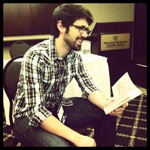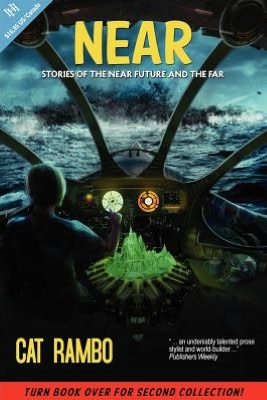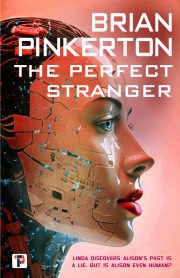Writing and Gaming: An Interview with James Sutter
by Cat Rambo
 Award-winning game designer and author James Sutter is a co-creator of the Pathfinder Roleplaying Game and the Fiction Editor/Senior Editor of Paizo Publishing. Beyond wrangling writers, he produces his own writing as well, and does it well: Death’s Heretic was #3 on the Barnes & Noble Best Fantasy Releases of 2011 and a finalist for the Compton Crook Award for Best First Novel, while his short stories have appeared such places as the first Machine of Death anthology and Beneath Ceaseless Skies.
Award-winning game designer and author James Sutter is a co-creator of the Pathfinder Roleplaying Game and the Fiction Editor/Senior Editor of Paizo Publishing. Beyond wrangling writers, he produces his own writing as well, and does it well: Death’s Heretic was #3 on the Barnes & Noble Best Fantasy Releases of 2011 and a finalist for the Compton Crook Award for Best First Novel, while his short stories have appeared such places as the first Machine of Death anthology and Beneath Ceaseless Skies.
Cat Rambo: How did you get started in game writing? Is it a course you’d recommend to other writers, and if not, what’s your suggestion on how to get started?
James Sutter: I’ve actually been working for Paizo since I was 20, so my road was a lot shorter than most. Right after college, I was working as a journalist, and realized that as much as I loved writing, I really didn’t care much for “facts” or “reporting.” Journalism in college had been primarily about music, sex, gonzo adventures, and social experiments–suddenly finding myself writing for suburban papers to pay the bills made me question some choices.
I was looking for an editorial position in the magazine world when I discovered that Paizo Publishing was local, and published not only the official Dungeons & Dragons magazines, but the venerable Amazing Stories as well. I made it my mission to work there, and took the only job available at the time–populating the Paizo.com web store with images for a nickel a jpg. From there I became an editorial intern, a customer service person, and finally an editor on Dungeon. A few years later, I was one of the main people to help launch the Pathfinder Roleplaying Game and its campaign setting, and we’ve since become the top-selling RPG, which still feels a little crazy!
So that’s my story, but in terms of what I actually did to make it happen, the answer is that I wrote and submitted. By the time I cold-called Paizo asking for a job, I already had a hundred articles published at various newspapers, as well as a couple of short stories, and there’s no question that my portfolio is what got me in the door. Once I realized that gaming was an option, I started writing for Dungeon and Dragonas well, working my way up into sourcebooks and tie-in novels. Nowadays I split my time fairly evenly between game books and fiction.
My suggestion to any writer looking to get into gaming is simply to start sending emails to your favorite gaming companies. There are surprisingly few authors in this industry, and certainly Paizo is constantly looking for new blood. Every book we produce is written out-of-house, by freelancers, which means we’ve got a huge amount of churn. If someone comes looking for a shot–especially if they’ve got some pro fiction credits, or have written for other gaming companies–we’re likely to give them one. And of course, it helps if the person already plays the game!
What have you learned from game writing that has been particularly applicable to fiction writing?
Game writing taught me how to build worlds. As someone who comes to speculative fiction primarily to see new places, creatures, and cultures, that’s huge. When you’re writing a sourcebook for a campaign setting, you’re not worrying about plot–you’re building a setting for someone else to tell their stories in. That means your world-building needs to stand on its own, and you get to flesh things out in a way you probably wouldn’t in a short story or novel.
When I write a sourcebook, I’m always thinking, “How could a Game Master use this bit to tell a story?” If something doesn’t provide at least one interesting story hook–and preferably more–I throw it out. There are books where I’m literally presenting a new idea, character, or adventure location every 100 words. If you start running out of good material, the fans can tell, and they let you know. You have to constantly work to keep things fresh.
I guess that’s the other thing that game writing and editing has really taught me: how to be creative on command. When a book needs to go to the printer in an hour and a freelancer’s article is running short, you have to come up with something to fill that empty page. Some of my favorite creations have come out of that last-minute panic, when I’m pulling random ideas out of the ether and stringing them together.
As a result, I’ve long since stopped worrying about muses and inspiration. If you create deadlines and stick to them, and just keep chipping away at the book, the creativity will come. As Spider Robinson says, just stare at the screen until beads of blood form on your forehead.
What do you value in a fiction writer when you’re looking for someone to write for Paizo?
As the Fiction Editor for Paizo, I have the amazing job of choosing writers for our Pathfinder Tales novel line. The first thing I look for is pro-level publications–while I’d love to have an open call, I simply don’t have the staff for it, so I only accept writing samples from folks who’ve already sold work elsewhere.
Next I look at the prose itself. Does the person write cleanly? Do they have a solid feel for rhythm? I know editors that say, “Oh, prose can be fixed if the ideas are good enough,” but I’m far too lazy for that. If I can see myself spilling blood over each page during editing, I’m going to pass on that author. Incidentally, I never cease to be amazed at how many authors don’t bother to proofread or spellcheck their writing samples before submitting them. It’s like showing up at a job interview without bothering to make sure you’re wearing pants.
After that, I look for the usual things: strong characters (since in a shared-world book, that’s what the author has the most control over), strong plots (because adventure gamers need plots with clear action and movement), and strong world-building (because like I said, I’m a fan, and even though the author’s using our world, I want to know that I could trust him or her to come up with cool new world elements to add to the canon). Familiarity with our game is also a huge plus, though not required.
Finally, and possibly most importantly, I’m looking for professionalism and flexibility. Writing for a shared world like a roleplaying game comes with its own unique challenges, and I need to know that an author is going to be able to work as part of a team, from answering emails promptly to remaining enthusiastic and creative even when ideas get shot down or changed in development.
How has working as an editor shaped your writing – and vice versa?
I think the biggest thing working as an editor did for me was removing the mystery around novels. It’s so easy to compare your own work to the books you’re reading for pleasure, but that’s not an accurate comparison–you’re comparing your own rough product with some else’s polished gem. Seeing the whole process from start to finish made me understand that books don’t spring forth fully formed–you work and rework the ideas until they’re right, and then you chip away at the manuscript. That old saw about inspiration and perspiration is really true–the latter is far more important.
I also hope that working as an editor has taught me how to be the sort of writer an editor wants to work with: someone whose manuscripts are as clean as possible, who never misses a deadline, who communicates, and who makes revisions promptly and with a smile. That last is key–I do my best to never argue with revision requests or line edits, even if I prefer my original version. While I’m always willing to discuss changes with my authors, I know that the last thing an overworked editor wants to do is battle over every comma, and an author who’s too precious isn’t one I’m going to hire again.
Of course, I also hope that being a writer has made me a better editor. I think if you’re only an editor, it’s easy to get used to being on top of the power dynamic, and to forget the effect that your words can have. I always do my best to encourage authors even when I have to reject them, and to give them as much input as possible into editorial decisions.
What challenges does writing in a world that’s a joint collaboration, rather than your own individual creation, pose?
I work in media tie-in, which is probably the most difficult form of shared-world writing. Let me state straight out that media tie-in writing is awesome, but it’s not for everyone. If you’re an author who hates working as part of a team, who hates doing research, or can’t handle having other people’s hands in your manuscript, you shouldn’t get into it. Tie-in writing is inevitably work-for-hire, which means that in addition to not owning the things you create, you’re ultimately beholden to the owner of the intellectual property. If your editor’s good, that means a lot of back-and-forth up front as ideas are proposed, modified, or shot down due to reasons that may have nothing to do with your proposal, finally resulting in an outline that’s been thoroughly vetted. If your editor isn’t as good, you may face significant revisions on the back end, including creative choices you don’t agree with but are contractually obligated to make.
I try to be really up-front with my authors about the fact that, as media tie-in writers, we’re less artists than artisans. While a tie-in novel can and should certainly be art, the relationship is not one of an artist going off into a cave, working alone, and then revealing her masterpiece. There are going to be compromises and disagreements, and while you can express your opinion, you serve at the queen’s behest. You’re using words like a bricklayer lays bricks–you may build a beautiful house, but it ultimately belongs to the client, and once you turn over the keys, they can do as they wish with it.
So given all of that, why would anyone want to work in tie-in? There are a ton of good reasons. Depending on who you are, the money could be a lot better than what you’re making off original fiction. Tie-ins also sell–check out which SF books are at the supermarket checkout–and usually come with a built-in audience that loves the brand and will buy your book regardless of the author, exposing you to a wider audience that may then follow you to your other work. Tie-ins can also give you a chance to play with a property you already enjoy as a fan, and I’ve had several authors tell me how much they love writing in a world that’s already been fleshed out, as it lets them focus more on plot and characters. If you’re the sort of author who needs inspiration, you get to pick and choose cool elements developed by other talented authors and then make them your own. It’s all a matter of personality and how you like to write.
In an essay for Fantasist Enterprises, you talked about creating new landscapes, and that’s certainly showcased in Death’s Heretic. When you’re trying to create a real wow of a landscape, what’s your process? How do you know when you’ve succeeded?
I’m a huge fan of world-building, which probably isn’t that surprising given my day job working on the Pathfinder campaign setting. I’ve always been drawn to authors like Dan Simmons and China Miéville, who create these vast and bizarre worlds to explore. So when I sat down to write my first novel, I knew I needed to find something that would let me showcase as many new vistas as possible. That way, regardless of whatever else the book did, at least it would keep world-builders like me entertained!
The resulting book, Death’s Heretic, is the story of an atheist forced to work for the goddess of death, tracking a missing soul across various planes of the afterlife. Getting to essentially reinvent the setting every few chapters–the robotic planar nexus city of Axis, the Boneyard where souls are judged, the primordial Maelstrom, the First World of the fey–was a real thrill, and allowed me to use a lot of what I’ve learned as a game designer.
While I’m afraid I don’t have a process, per se, I think my best advice on world-building would be:
1) Go beyond Tolkien. Everyone loves dwarves and elves, but if you cleave too tightly to traditional clichés, you’re not bringing anything new to the world-builders.
2) Have multiple angles. One-trick pony worlds are boring, and combined ideas multiply rather than add. Come up with several different ideas for interesting settings and see if you can merge them into one.
3) Explore the ramifications. Often the stories you come up with trying to explain how your crazy world ideas fit together are more interesting than the crazy ideas themselves. When you create a bizarre monster, don’t just give it tentacles–think about why it evolved those tentacles in the first place, and how they fit with its behavior, culture, and environment.
As for how you know you’ve been successful… well, I don’t think you ever do, until the reviews start coming in. But if I can think of a thousand other stories I could tell in a setting, that’s usually a good sign.
How do you see game writing and fiction interacting in the future?
I think there’s going to continue to be more and more game fiction out there. In a publishing world where everybody’s skittish, a successful game brand has the appeal of an established audience. It’s the same reason Hollywood’s constantly rebooting franchises and playing off nostalgia. But game writing also isn’t just about novelizations and fiction–the writing of games themselves has become a huge business. Look at video games like Bioshock or Mass Effect or Dragon Age–these are games with sprawling storylines, breathtaking worlds, and memorable characters. Those elements require writers, and the best of them keep the audience invested long after they’ve killed the bad guys or appreciated the digital scenery. Our society craves interactive entertainment, so I think game writing is only going to get more prevalent as our culture gets more technological.
What genre of games is your favorite: video, tabletop, casual…? Why?
Even after spending a third of my life in the industry, the tabletop roleplaying game is probably still closest to my heart. Video games are great, but the fun of getting your friends around a table and telling crazy stories together is impossible to beat. The fact that there are literally no boundaries–the story can go wherever you take it–means that tabletop will always be more flexible than a programmed video game.
That said, I should also give a shout-out to Rock Band. Any game that gets a whole party of people singing together is fabulous, and the fact that it’s trained a whole new generation of amazing drummers is a boon to society. Kids growing up today will have no idea how hard it used to be to find a quality drummer…
What’s the story behind your recent piece in Beneath Ceaseless Skies? Did it start as a Machine of Death story? Did you have any trouble reshaping it for BCS? Or did you even need to?
A few years ago, I had the honor of being included in Machine of Death, a shared-world anthology in which the only unifying theme was that there’s a machine which can cheaply and accurately predict how you will die, though the answers are often cryptic. The book was an independent production, but the editors were well established in the webcomics community, and by asking their fans to all buy it on the same day, they became the #1 selling book on Amazon for two days (knocking Glenn Beck and Keith Richards out of the spot). It ended up getting a lot of press, as a lot of folks were excited by the proof that grass-roots fan support could take a first-time publisher to the top, sell a dozen translation rights and film rights, etc.
Anyway, when the call went out for a sequel, I decided to press my luck and write another story–one about a princess in the post-apocalyptic Appalachian Empire, where you can’t be queen unless you know how you’ll die. For various reasons, it wasn’t able to be included in the book, but I was still really excited about the piece, and reworked it slightly to help the death-prediction angle stand alone. Reselling stories written for themed anthologies is always tricky, but to my delight, Scott at Beneath Ceaseless Skies picked it up immediately, and it’s currently up for free on their site.
•••
 Cat Rambo’s most recent short story collection, Near + Far, appeared this fall from Hydra House. Find links to her fiction as well as her upcoming online classes on her website, http://www.
Cat Rambo’s most recent short story collection, Near + Far, appeared this fall from Hydra House. Find links to her fiction as well as her upcoming online classes on her website, http://www.


